Why European consumers are split over the future of AI
European consumers might fear the impact of artificial intelligence on the job market, but for now, it appears they aren't too concerned about actually being replaced by new technology. As results from our latest ING Consumer Research survey show, consumers aren't quite clear on what to expect from the rise of AI just yet
AI both an opportunity and a danger to society
In a recent article, we took a first look at the economic potential of artificial intelligence and some of the hurdles that might stand in its way. We consider AI – generative AI in particular – a general-purpose technology that might change the way we interact with machines, and we think it should enable further advancement in a number of other fields. Acceptance and regulation will play an important role in determining the extent and speed at which AI will permeate our daily lives and workplaces, and for this reason, understanding consumers' opinions on the topic is vital.
In an ING Consumer Research survey conducted in December of 2023, consumers in Belgium, Germany, the Netherlands, Poland, Romania, Spain and Turkey were asked for their views on various AI-related subjects. Among questions referring to private and professional use of generative AI and the future of the labour market were also some regarding broader societal issues. The ambiguity with which the topic of artificial intelligence is viewed might find its most apt expression in the fact that the statements “AI is a danger to society” and “AI is an opportunity to society” both garnered significantly more agreement than disagreement from participants.
An ambiguous attitude sees AI as a potential danger…
Share of respondents agreeing/disagreeing to the statement “AI is a danger to society”

…as well as an opportunity
Share of respondents agreeing/disagreeing to the statement “AI is an opportunity to society”

Time saving and better-than-expected results
The attention that the topic has recently gathered has largely been fuelled by the accessibility of generative AI tools to the broader public – especially ChatGPT, which has been live for well over a year now. When asked about their familiarity with these tools, 45% of respondents indicated they had used one at least once during the past six months in their private life; 47% (out of those who currently work) reported the same for their professional life. There is a large overlap between these groups. In total, 50% have used a generative AI tool in their private or professional lives (or both).
Those who report using generative AI tools in their professional life at least once in the past six months seem generally satisfied with the experience in various aspects. 25% highlighted the ease of use (vs 17% either taking a while to get to grips with the technology or quickly giving up), while 28% found that the results were better than expected (vs 9% reporting the opposite), and 35% reported that generative AI tools helped them save time (vs 6% indicating that it cost them more time than it helped them save). The picture regarding private use looks similar, albeit slightly less pronounced.
Generative AI leaves a good first impression
Share of respondents to the question: “How would you describe the experience you had using generative AI in your professional life?”
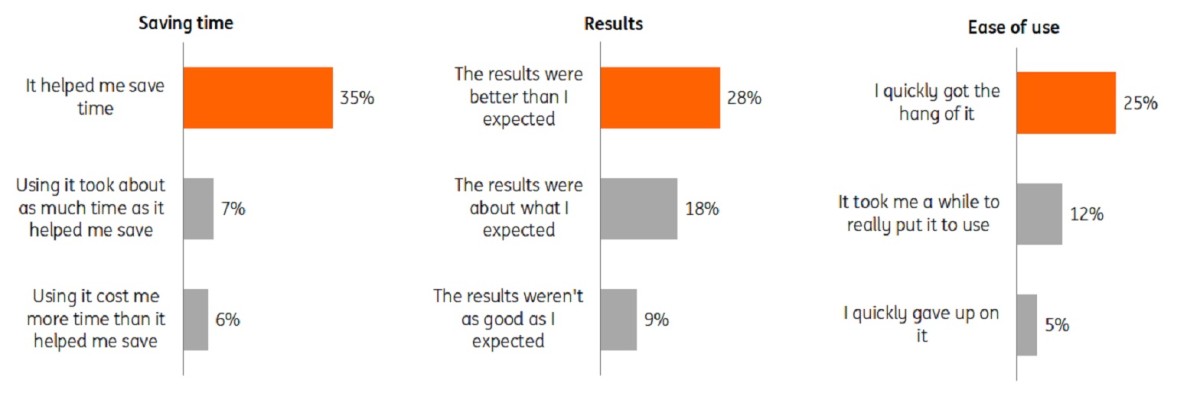
| 64% |
expect products and services using AI to profoundly change their lives over the next five yearsout of respondents who correctly answered at least 3 out of 10 factual questions on AI |
Looking at the broader impact of AI in general, viewpoints appear to depend on familiarity with the topic. Out of the participants that were able to correctly answer at least 3 out of 10 factual questions on AI and its current use in everyday products, 38% agreed or strongly agreed that “products and services using AI have profoundly changed my daily life in the past five years”. 64% “think that products and services using AI will profoundly change my daily life in the next five years”. For those with two or less correct answers on the factual questions, the figures stand at 19% and 40% respectively. It therefore appears that these numbers may reflect varying levels of awareness regarding AI’s already widespread use in a number of everyday products and services rather than evidence of it having a smaller impact.
AI is believed to have a negative impact on the job market…
Expectations for the impact that AI will have on the overall job market in individual countries are rather pessimistic. 40% expect that, on balance, the widespread use of AI will cost more jobs than it will create over the next five years. This holds true across all age groups, genders and professions.
Pessimistic view of the job market
Share of respondents to the question: “What impact do you think the use of artificial intelligence (AI) in general will have on the overall job market in your country in the next five years?”
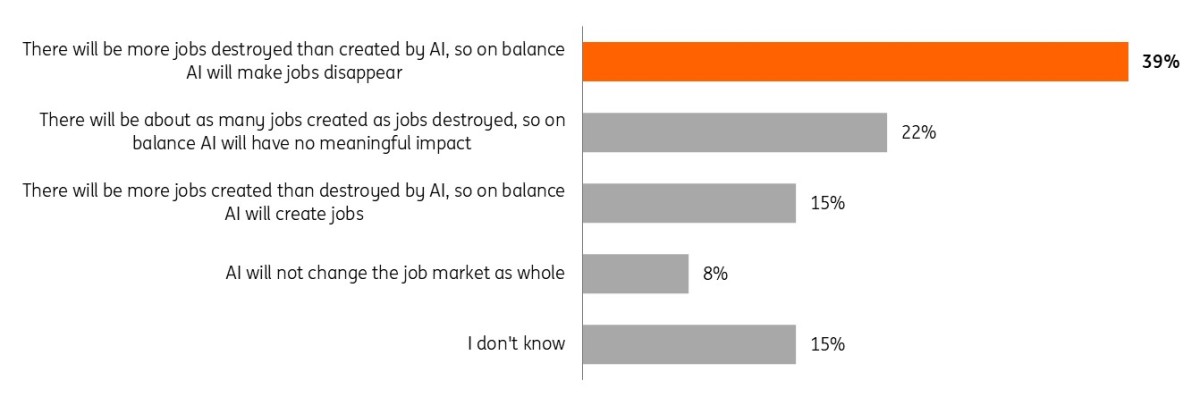
However, when it comes to their own jobs, respondents didn't appear to be all too worried. Just 3% of those currently employed expect their jobd to be replaced by AI in the next five years, with managers and professionals reporting the lowest numbers here. A full third do not expect any significant impact on their job whatsoever.
When it comes to their own jobs, people aren’t all that worried
Share of respondents to the question: “What impact do you think the use of artificial intelligence (AI) in general will have on your own current job in the next five years?”
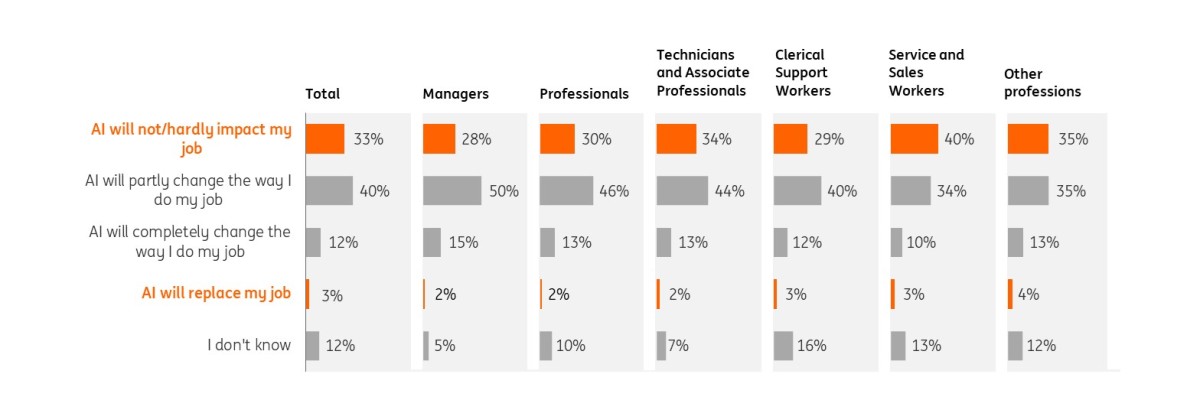
However, a majority of people also don’t believe that AI will just move by. More than half of all respondents expect it to at least partly change the way they do their job. Those that do expect an impact from AI mostly see it dealing with repetitive tasks and improving efficiency. Only a small minority expects AI to take over with decision-making.
Impact from AI mostly expected to deal with repetitive tasks and improving efficiency
Share of respondents on the question: “In which way do you think the use of artificial intelligence (AI) in general will affect your own current job in the next five years?”

The rather optimistic outlook on respondents’ own jobs – while including significant changes being brought about by AI – might be more well-founded than the pessimistic expectations for the job market as a whole, as we’ll elaborate on in more detail in our next articles over the coming weeks.
…and a positive impact on economic growth
This pessimistic view regarding the consequences for the job market does not keep people from expressing rather optimistic expectations of overall economic growth. More than 40% expect a positive impact on growth over the next five years, both on a global and local level, while less than 15% expect a negative impact. People are slightly more optimistic about the impact of AI on worldwide growth than local growth, and this holds true for all seven countries included in the survey.
We expect it will take around five years for any significant growth impact of AI to materialise in the EU. The US, on the other hand, might progress more quickly in this space.
Many expect a positive impact of AI on economic growth
Share of respondents to the question: “Over the next five years, what impact do you think the use of artificial intelligence (AI) in general will have on economic growth in your country/worldwide?”
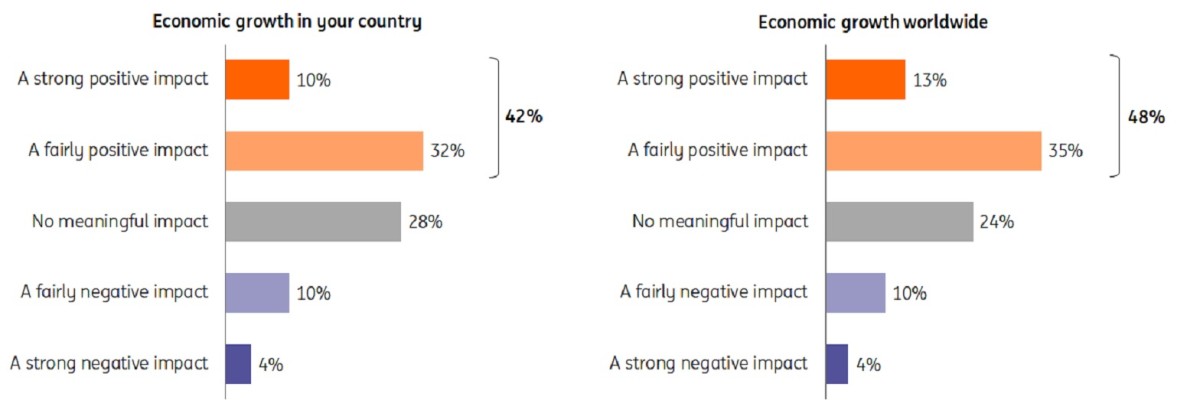
Consumers want AI to be strictly regulated
The discrepancy between overall growth expectations (positive) and the expectations for the job market (negative) highlights the difficulty of ensuring broad participation when it comes to the gains being made from AI use. Along with the broader societal implications, this might be one of the reasons for a wide consensus that strict regulation of the use of AI is necessary – even at the expense of some (or most) of its opportunities. A shift from labour income to capital income is to be expected, but to what extent can and will it be mitigated by redistributive policies?
Large majority in favour of tight rules
Share of respondents to the question: “To what extent do you agree or disagree with the following statements about the rise of artificial intelligence (AI) in general?”
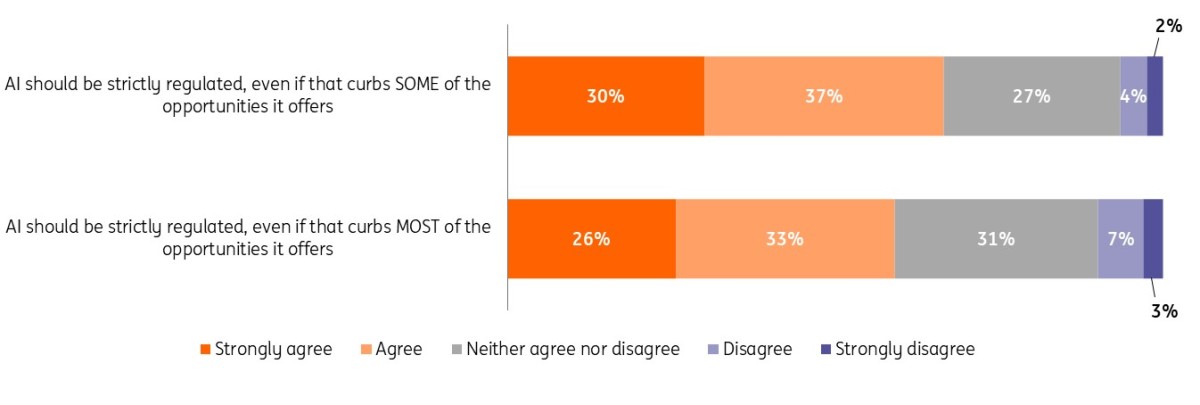
THINK on AI
All in all, consumers aren’t entirely sure what to expect from the rise of AI. They see it both as a danger and an opportunity – and while they are pessimistic about the job market, they do believe in a positive growth impact. Over the coming weeks, our goal is to put you in a better position to decide for yourself what to expect, at least from an economic point of view. We'll discuss the labour market, productivity and growth, prices and interest rates – be sure to keep an eye out for updates.
This research on the attitudes and opinions of consumers with regard to AI in seven European countries (Belgium, Germany, the Netherlands, Poland, Romania, Spain and Turkey) was carried out by Ipsos, commissioned by ING, in December 2023. In each country at least 1,000 respondents were interviewed, representative by age, gender and region. The figures used in this article are simple averages across all seven countries.
Download
Download articleThis publication has been prepared by ING solely for information purposes irrespective of a particular user's means, financial situation or investment objectives. The information does not constitute investment recommendation, and nor is it investment, legal or tax advice or an offer or solicitation to purchase or sell any financial instrument. Read more
